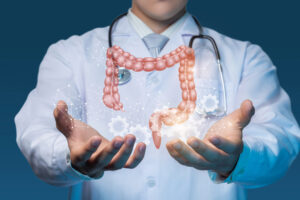If your stomach feels off more often than not, your digestion might be trying to tell you something. Bloating, fatigue, frequent heartburn, or inconsistent bowel habits are more than discomfort.
They are signs your gut may not be functioning at its best. And when digestion is out of balance, it affects more than your stomach. Your energy, immune health, mood, and even skin all take a hit.
The good news? You don’t have to live with it.
In this blog, we’ll break down the common signs that your digestion needs a reset and share simple, effective ways to get things running smoothly again. From diet and lifestyle shifts to gut-supporting therapies, we’ll cover what works — so you can feel better, naturally.
How does your digestive system work?
Your digestive system is a hardworking machine that breaks down the food you eat into the energy and nutrients that your body needs to function. Here’s how it works:
- Mouth: Digestion starts in your mouth. When you chew, saliva mixes with food to break it down.
- Esophagus: The chewed food travels down your esophagus to your stomach.
- Stomach: In the stomach, acids and enzymes mix with the food to break it down further into a liquid.
- Small intestine: This liquid moves into the small intestine, where most digestion and nutrient absorption happen. Helpful juices from the liver and pancreas join in to help digest fats, proteins, and carbohydrates.
- Large intestine: Any leftovers move to the large intestine, where water is absorbed, and the rest forms into stool.
- Rectum: The waste leaves your body through the rectum.
Each part plays a special role in keeping you healthy. A working digestive system ensures you get the nutrients your body needs!

Common signs of digestive distress
Recognizing the signs of digestive distress early will help you take steps to improve your digestive health. From stomach pains to irregular bowel movements, these symptoms might indicate that your digestion needs a boost. It’s important to be aware of what your body is telling you and to take action to maintain a healthy gut microbiome.
- Frequent stomach pain and cramping
Frequent stomach pain and cramping are uncomfortable and often signal that something is off in your digestive tract. These pains could arise from many factors, such as indigestion, food intolerance, or even bacterial overgrowth.
Pay attention to when the pain occurs and what you’ve eaten, as spicy food or foods that are high in fat and sugar often trigger digestive issues. If pain persists, a health care provider is able to help identify whether it’s a more serious condition like irritable bowel syndrome or an inflammatory bowel disease.
- Bloating and excessive gas
Bloating and excessive gas are signs that your digestion might not be running smoothly. After eating, you might notice your stomach feels swollen or uncomfortable. This may happen if your digestive tract is struggling to break down foods properly, often due to a lack of beneficial bacteria or an overgrowth of harmful bacteria.
Eating more soluble and insoluble fiber helps these symptoms. Fiber helps food move through your gut more easily, reducing gas. Probiotic foods like yogurt or fermented foods will introduce more beneficial bacteria, improving overall digestive health.
- Persistent heartburn or acid reflux
Heartburn or acid reflux is another common sign of needing digestive support. This burning sensation in your chest occurs when stomach acid travels back up your esophagus, often due to gastroesophageal reflux disease or poor gut health.
Avoiding certain foods, such as caffeine, alcohol, and spicy food, helps reduce these symptoms. Probiotic supplements also help balance stomach acid and enhance digestion.
- Irregular bowel movements
Irregular bowel movements, such as constipation or diarrhea, are indicators that your digestion needs attention. This may happen because of diet changes, stress, or dehydration. Keeping a balanced intake of water and fiber helps regulate your digestive system.
Soluble fiber helps form stools, while insoluble fiber adds bulk, both of which are vital for smooth digestion. If these issues persist, it’s important to check with a healthcare provider to explore more specialized digestive wellness programs and ensure there is not an underlying condition.

- Fatigue and lethargy
Digestive health plays an important role in nutrient uptake, and poor gut health leaves your body lacking the energy it needs. Ensuring your diet includes a mixture of fruits, vegetables, lean proteins, and whole grains boosts your nutrient intake.
If tiredness continues, evaluating your digestion with a healthcare provider might reveal hidden digestive issues.
How to boost your digestion
Thankfully, there are effective ways to support our digestive health. By making certain lifestyle changes and being attentive to what we eat, we enhance our digestive wellness naturally. Let’s explore how understanding and improving our digestion leads to better well-being and happier tummies.
Adopt an elimination diet
Sometimes, food that’s supposed to nourish us causes trouble instead. An elimination diet helps identify these troublesome foods, especially for people experiencing digestive issues. This involves removing certain foods and then reintroducing them one at a time to pinpoint food intolerances.
This process helps with conditions like irritable bowel syndrome or other digestive problems. During the elimination period, take notes on how you feel. Did removing a certain food reduce abdominal pain or discomfort?
Once you start reintroducing foods, pay close attention to how your body reacts. This careful observation will help you identify foods that might be causing stomach pain or acid reflux. Discuss the plan with a healthcare provider to ensure it’s safe and beneficial for you.
Understanding the types of food that work best for you is key. For example, if eating spicy foods upsets your stomach, it’s best to limit them. While undergoing an elimination diet, focus on maintaining a healthy balance of nutrients to support your digestion. The goal is to develop a diet that fits your body’s needs and makes you feel great.
Incorporate fiber-rich foods
Eating fiber-rich foods is a wonderful step to boost digestion. Fiber helps keep things moving along in the digestive tract. There are two main types of fiber: soluble and insoluble. Each plays a significant role in digestive health.
Soluble fiber, found in foods like oats and apples, helps to slow digestion and is beneficial for those with loose stools. Eating enough soluble fiber promotes the growth of beneficial bacteria, which keeps harmful bacteria at bay.
On the other hand, insoluble fiber, present in foods like whole grains and vegetables, adds bulk to stool and helps it pass more quickly through the digestive system. This is especially helpful for preventing constipation and supporting regular bowel movements.
When you include more fiber in your diet, start slowly to give your digestive tract time to adjust. Remember, consuming fiber is only effective if you’re also drinking enough water, which helps fiber do its job more effectively. A good mix of these fibers will support digestive health and keep your digestive system functioning well.

Manage stress effectively
Everyone experiences stress at times, but too much stress negatively impacts digestive health. Stress leads to issues like acid reflux and even exacerbate conditions like irritable bowel syndrome. Learning to manage stress is vital for smooth and happy digestion.
One effective way to manage stress is through deep breathing exercises. Taking slow, deep breaths will help calm your mind and reduce stress hormones that may affect digestion. Regular physical activity is another excellent stress reducer. It doesn’t have to be rigorous—gentle activities like walking or yoga help relax your muscles and calm your mind.
Besides physical activities, setting aside time for hobbies you love can be soothing. Reading, drawing, or even gardening brings joy and peace, which helps reduce stress levels. Ensuring you get enough sleep is also important, as quality rest helps rejuvenate your mind and body.
By managing stress effectively, you’re also helping to maintain a healthy gut microbiome and better digestion.
Utilize probiotics and prebiotics
Introducing probiotics and prebiotics into your diet can significantly enhance digestive health. Probiotics are live beneficial bacteria that help balance the bad bacteria in your digestive tract. They’re found in fermented foods like yogurt, kefir, and sauerkraut. Adding these probiotic foods to your daily meals can help you maintain a healthy gut microbiome.
Prebiotics, on the other hand, are types of fiber that feed the beneficial bacteria already living in your gut. Foods such as bananas, onions, and garlic are rich in prebiotics. They nourish the bacteria, helping them flourish.
Combining both probiotics and prebiotics can optimize gut health and improve digestive symptoms like bloating or irregular stools. Consider including natural sources of these microbiome-friendly nutrients in your diet.
If you’re interested in supplements, discuss probiotic supplements with a healthcare provider to find what might be suitable for you. Boosting your diet with these powerful allies can lead to noticeably better digestive health and overall well-being.
When to seek medical advice
Here are some situations when reaching out to a healthcare provider is essential:
Persistent pain
If you experience ongoing abdominal pain or stomach pain that doesn’t go away, it’s important to consult a doctor. This could be a sign of digestive issues or more serious conditions like acid reflux or inflammatory bowel disease.
Unexplained weight changes
Sudden weight gain or loss without changes in diet or activity level may indicate poor gut health or bacterial overgrowth, which needs medical attention.
Digestive symptoms
Frequent digestive symptoms such as diarrhea, constipation, or bloating might be related to digestive tract problems, including irritable bowel syndrome or autoimmune diseases.
Severe food intolerance
If eating certain foods consistently leads to discomfort or allergic reactions, it’s crucial to seek advice on managing these food intolerances effectively.
Chronic acid reflux
Experiencing acid reflux or symptoms of gastroesophageal reflux disease regularly may damage the esophagus and require professional assessment.
Don’t hesitate to seek help when you notice these signs. Your healthcare provider can explore digestive wellness programs to support your digestive health effectively.
Struggling with digestive issues? High West Medical can help
You don’t have to live with bloating, discomfort, or unpredictable digestion. At High West Medical, we take a comprehensive, personalized approach to gut health, identifying the root cause of your symptoms and creating a targeted plan to restore balance with our digestive wellness programs.
Whether you’re dealing with chronic issues or occasional flare-ups, our expert team is here to help you feel better from the inside out.Contact High West Medical today to schedule your consultation and take the first step toward better digestion, more energy, and lasting wellness.





